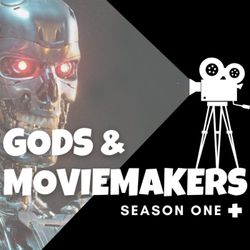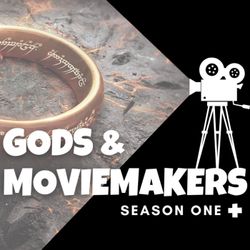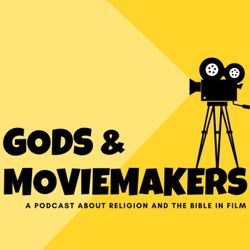Latest episode

4. Elf Redux
40:22||Season 0, Ep. 4In a huge departure from the normal format, Katie & Joe revisit the recent Holiday Special episode on Elf (2003), featuring Dr Chris Deacy, to share some insights gained and questions raised by that episode. If you have not yet listened to our Elf episode, we highly recommend doing so first, and coming back to this one. Discussion points include: The Jews Who Wrote Christmas, by Rob KapilowElf screenwriter, David Berenbaum's relationship with Christmas films, as discussed in The Movies That Made UsPew Research's Portrait of Jewish Americans (2013)Santa Slashers, Silent Night Deadly Night (1984) and Violent Night (2022)And, is Christmas really pagan? Professor Candida Moss has an answer for you. If you know of any research that is relevant to the topics discussed in this episode, or would simply like to share your thoughts on our discussion, please do Get In Touch!And if you're still not done with the cultural trappings of Christmas yet, do check out "The Very Recent Origins of the Christmas Tree" by friend of the show, Dr Andrew Mark Henry.Episode Credits:Thanks again to Dr Chris Deacy for his contribution. And to everybody who voted in one of our polls and shared your thoughts with us - it was much appreciated!
More episodes
View all episodes

3. Elf (2003)
43:00||Season 0, Ep. 3In 2003, relative newcomers, Will Ferrell and Zooey Deschanel, were cast in a film written, produced, and directed by a bunch of inexperienced guys, to star alongside national treasures, Ed Asner and Bob Newhart, and screen icon, James Caan. The film was Elf: a goofy story about a man, raised in the North Pole among Santa's elves, who sets off to New York City to find his long-lost Scrooge-esque father. Inspired by the stop-animation classic, Rudolf the Red-Nosed Reindeer (1964), infused with references to other Christmas staples such as A Christmas Carol and Miracle on 34th Street (1934), and scored with beloved Christmas music spanning from the traditional (The Nutcracker) to mid-century croons (Baby It's Cold Outside), Elf quickly became classic in it's own right. For many people, this film that is a loving homage to so much Christmas media that came before is now the proto-typical Christmas movie. What can Elf tell us about the role movies play in Christmas celebration, and the common lessons they convey? And how should we understand them: As strictly secular content? Or something a little more religious? Join us for this special holiday episode as we chat with Dr Chris Deacy about Christmas movies and home-spun religion.Episode Credits:Many thanks to Dr Chris Deacy for his time and expertise. Chris is the Director of Studies for the School of Culture and Languages and the Course Lead for Philosophy, Religion and Ethics at the University of Kent. Chris's PhD back in the late 1990s, in the University of Wales, was in the area of redemption and film, and he has written several books over the years in the area of theology and film, with a particular focus on the cinema of Martin Scorsese. Chris hosts a weekly podcast called Nostalgia Interviews With Chris Deacy, and a weekly film programme on KMTV in Kent, where guests discuss their four favourite films. Chris has also presented a six part BFI-funded documentary TV series, called Generation Why, about religion, spirituality and ethics which explores young people’s views around faith and culture in the UK today. Chris’ latest book is, “Christmas as Religion: Rethinking Santa, the Secular, and the Sacred”. You can find Chris @DeacyChris
2. The Crucible (1996) Continued
52:41||Season 0, Ep. 2It's February 1692 and a mysterious illness has befallen two young girls in Salem, Massachusetts. Eleven-year-old Abigail Williams and nine-year-old Elizabeth Parris have been having violent fits, and bouts of catatonia. A doctor declares the cause: Witchcraft! Three women of low social standing are accused. But it is not long before the accusations start to spread. Paranoia overtakes the community. Witches are seen everywhere. Over 150 people are accused, and 25 dead before this infamous witch-hunt finally comes to an end. How could this all have gotten so out of hand? Was it all superstitious nonsense run wild, or does this episode carry important lessons for us today?Join us in this second and final part of our Halloween Special as we explore the historical backdrop to Arthur Miller's The Crucible (1996).If you haven't yet listened to our first episode on The Crucible & McCarthyism, we suggest you do so first.A glossary and full list of resources can be found on our website.
1. The Crucible (1996)
25:15||Season 0, Ep. 1It's the first years of the Cold War. Fascism has been defeated abroad but a new Red enemy is emerging and the US government is stoking fear among it's citizenry. Neighbour is turning on neighbour; friend on friend; paranoia is spreading. What do YOU do?Playwright Arthur Miller looked to a similar event in American pre-history to produce The Crucible (1953). Set in 1692, Salem, Massachusetts, the play (and 1996 film adaptation) explores a witch-hunt that consumed the community. Accusations of witchcraft and consorting with the devil abound, scores are settled, lives ruined. Behind it all, Miller issues a clarion call against McCarthyism, and witch-hunts more broadly. Join Joe and Katie for this two-part discussion on the background to this chilling story, in our Halloween 2023 special.
16. The Terminator & Pedagogy
32:46||Season 1, Ep. 16In this bonus episode on The Terminator (1984), Dr Michelle Fletcher talks to us about using the complete Terminator series in a classroom to highlight the way in which texts change over time in response to cultural and historical shifts. We also discuss how to teach with film without asking students to watch an entire movie. If you haven't listened to our main episode of The Terminator, we recommend doing so first, so you have the full context for our discussion. Many thanks to Dr Fletcher for her extra time.
2. The Lord of the Rings & Pedagogy
07:34||Season 1, Ep. 2In this bonus episode on The Lord of the Rings: The Fellowship of the Ring (2001), Dr Marian Kelsey explains how she uses characters from The Lord of the Rings to teach about biblical prophets - including, the role of the prophet and the nature of prophecy - and the difficulty of discovering that students are not necessarily familiar with the same cultural content as their teachers. If you haven't listened to our main episode on The Lord of the Rings, we recommend doing so first, so you have the full context of our discussion. Many thanks to Dr Kelsey for her extra time.
14. The Last Temptation of Christ & Pedagogy
21:27||Season 1, Ep. 14In this bonus episode on The Last Temptation of Christ (1988), we chat some more with Matt Page about using The Last Temptation in public education settings (such as church groups) to help people understand that they bring their own context and cultural baggage, to any text they read, including the Bible. Matt also talk about how he addresses antisemitism in Jesus films, and the challenges posed to the educator when the film deals with deeply-held religious beliefs, and he provides us with his top recommendations to learn more about The Last Temptation.If you haven't listened to our main episode on The Last Temptation of Christ, we recommend doing so first, so you have the full context for our discussion. Many thanks to Matt for his extra time.
